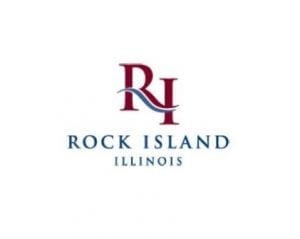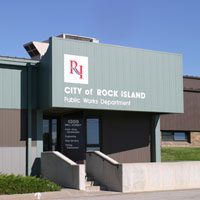EXCLUSIVE: Should Rock Island Sell Its Water? An Uncut, Uncensored Q and A With American Water
EXCLUSIVE: There’s been a wellspring of controversy over the past few months as the Rock Island Mayor and City Council have contemplated selling the city’s water and sewer systems to a private company, American Water.
On July 26, American Water gave a presentation to the city government officials pitching them the potential sale. After that, the council and

Rock Island Mayor Mike Thoms has come under fire for ongoing discussions about privatizing the city’s water and sewer system.
mayor had their regularly scheduled meeting, at which there was a full house of local residents protesting against the sale, not just to American Water, but to any private company.
In addition, the American Federation of State, County and Municipal Employees is the largest trade union of public employees in the United States. AFSCME 31 represents Rock Island, and posted the following on their website:
“According to one study of ten Illinois communities which sold their water systems to American Water’s Illinois subsidiary, water rates more than doubled on average over a ten-year period. This corresponds to an extra $405 on the typical annual water bill of a household using 72,000 gallons of water a year. In comparison, national surveys have found that water and sewer bills typically increase by about 5 percent a year. That means that customers of these privatized systems are seeing their water rates grow 260 percent faster than usual.
“In many cases private control of water systems has resulted in worse drinking water quality. For example, Pittsburgh’s water quality violations followed a chemical treatment change that occurred after the city hired a large multinational firm to provide management and consulting services to the city.
“Private operators’ profits are directly tied to cutting jobs and reducing benefits to employees. Water privatization results in the loss of 1 in 3 jobs, according to Food and Water Watch, and will jeopardize retirement security for Rock Island workers as employees lose access to the public pension system.”

Thurgood Brooks is among those leading a challenge against the sale of the water and sewer systems.
In response to the controversy, a group of local residents organized several Facebook pages, including Stop The Sale Of RI Water and Sewer, led by former mayoral candidate Thurgood Brooks, and Stop The Sale – RI, both of which I was invited to join, and did join, as a member. The latter page is public, and one of the posts involved a number of citizens talking about phone calls they had gotten featuring a push poll survey about the potential sale of the water and sewer. Given the interest, I responded in the comments that I was going to be doing a story on the phone calls.
In response to that comment, I got an e-mail from Karen Cotton, Senior Manager, External Communications, Illinois American Water, who said she had seen my comment and was wondering if I was interested in interviewing her for the story. Of course, I said yes. As per our preferred mode of communication in interviews of this nature, I offered to have our online exchange run completely unedited and in its entirety. As with my podcast, QCUncut, I prefer to present dialogue unedited so that the audience can get all the information and context without having it selectively edited or chopped into soundbites.
That is what follows here. I sent Karen these questions. She sent me back her responses. Both questions and answers are below, completely as they were written without any editing, censoring, or embellishment. I appreciate her taking the time to respond to the array of questions, which were very direct and candid in regard to reflecting the sentiment of a large swath of Rock Islanders.
Read the interview in full, consider it as information to add to your own research, and make up your own mind. Thank you.
The first question on everyone’s mind is, if Illinois American Water took over, how much of a rate increase would there be in the first year, and how much would there be in subsequent years following?
We have publicly stated that if we acquire the City of Rock Island’s water and wastewater systems, we will mirror the city’s rate increases. One of the key advantages that Illinois American Water can provide Rock Island is the leverage we can offer for a similar rate increase. Even without an Illinois American Water purchase, Rock Island water and wastewater rates are going up. Illinois American Water can provide up to six times the capital investment into both systems for the same increases.
Regarding the rate making process for a private water utility like Illinois American Water, we must request approval for base rate changes from the Illinois Commerce Commission (ICC). The process is very different from a city council vote for rate changes. Any change in base rates undergoes an 11-month review by the ICC which includes data to back up the request, sworn testimony, and public comment. This transparent process takes into account the interests of our customers. At the end of the 11-month process, the ICC decides what is fair and reasonable. Illinois American Water’s rates support the cost of service as well as needed maintenance and local system investments.
Why does Illinois American Water have an interest in purchasing the Rock Island water and sewer systems?
We have a long history of providing water and/or wastewater service in the Quad Cities area. In a sense, we’ve been neighbors to Rock Island for over 100 years as our sister company, Iowa American Water has been in Davenport for over 100 years.
Over the years we’ve expanded our footprint through partnering with communities on solutions to their water and wastewater challenges. The challenges communities face can vary from wanting to focus on other priorities, significant investment and financial burdens, keeping up with stringent EPA requirements, etc. We are committed to helping municipalities solve their water and wastewater challenges. This is the heart of what our team does every day.
In many other markets, including nearby Clinton and the Iowa side Quad-Cities, your company has made a significant investment and has laid out plans to invest in repairs and infrastructure. How much money is it anticipated that improvements will cost to handle any and all repairs to Rock Island’s system?
We anticipate the need to invest approximately $60 million in Rock Island’s water and wastewater systems. This would include capital improvements for reliability/redundancy, water main replacements, lead service line removal, and improved wastewater treatment.
Obviously, if you bought the city’s water, there would be a massive cash outlay at the onset for you. From what I gather, there would also be some infrastructure repairs that would be done, which would likewise push the expenditures up on your end. You’re a publicly traded company beholden to shareholders to increase their dividends, which means producing profits, as quickly as possible to offset expenditures. How would that philosophy impact such elements as quality and customer service, and how would your company’s desire to make up your expenditures reflect in the raising of rates and/or cutting of services or other elements current customers enjoy?
It is important people understand American Water is a regulated utility. Our earnings are based on our investment in our systems, for example, water and sewer mains, treatment plants, hydrants, water towers, pump stations, etc. So, we are encouraged to invest in the system. But our regulators allow us only the opportunity, not the guarantee, to earn a return. We must run the system efficiently and keep control of our expenses.
Excellent customer service is an important aspect of achieving a reasonable return, as is operating efficiently. Our core values are centered around our customers and focused on the safety of our employees, operating efficiently, doing our part to protect the environment and being a good neighbor. The Commission also regulates our service – for example private water utilities are responsible for maintaining and replacing fire hydrants. Because of this, our team is in constant communication with firefighters on where hydrants need to be replaced and/or installed. We’ve worked with several communities to achieve high ISO ratings, which benefits residents in their insurance premiums.
Recently our team was recognized by J.D. Power for our commitment to service. For the second year in a row Illinois American Water Ranked #1 in the J.D. Power Water Utility Residential Customer Satisfaction Study – Midwest Large Region. The Company also ranked highest in three of six factors measured including price, conservation, and communications. We’re proud of our track record.
In 2017 and again in 2021, Iowa American Water raised rates for its customers. Is a rate increase of this type and percentage typical for your company in the markets it services?
Many factors are involved in a decision to make a request to adjust rates, including investment, cost of service provided, and maintenance. Like Illinois American Water, our sister company, Iowa American Water is required to go through their public utility commission for review and approval. This stringent process is an added benefit to customers. It’s also important to understand that all utilities across the nation are facing a need to invest and upgrade aging infrastructure.

The city of Rock Island logo.
The Illinois Section of American Society of Civil Engineers’ (ASCE) latest Report Card (2018) for Illinois’ infrastructure rates the state’s water and wastewater systems each with a C- grade. The C- grades for water and wastewater systems falls between C and D ratings which are defined respectively as mediocre, requiring attention and poor, at risk. According to report findings, a trend of underinvestment in recent years threatens Illinois’ competitive advantage and the health, safety, and welfare of citizens.
The findings provide more evidence for the need to move quickly on updating and maintaining water and wastewater systems to ensure reliable service for health, safety, and economic development. Illinois American Water proactively invests annually to address these critical investment needs, and not be a part of the problem. Last year we invested approximately $187 million across the state to upgrade critical water and wastewater infrastructure.
In various cities and municipalities around Illinois, customers have publicly complained about repeated high rate hikes. In Homer Glen, according to data released in a 2017 Chicago Tribune expose, the Illinois Commerce Commission (ICC) approved an initial 40 percent rate increase in 2003. Then, a 26 percent increase in 2010. In 2017, a 15 percent increase. That’s over 80 percent in 14 years. What would be the reason for such steep rate hikes, and would Rock Island see the same kind of rate hikes?
While we disagree with many aspects of the Chicago Tribune story, it is important to note that the Rock Island system is very different than water systems in Chicago, which buy treated Lake Michigan water from the City of Chicago and other municipalities, and do not treat their own water. If you read part 1 of the Chicago Tribune series you reference under From Lake to Tap (http://graphics.chicagotribune.com/news/lake-michigan-drinking-water-rates/index.html), you will see the impact of purchased water rates. Water systems like Illinois American Water who purchase treated Lake Michigan Water from water suppliers like the City of Des Plaines, Bedford Park, etc. pay a fee that is not regulated. And, for every community the water passes through while it makes it way to our customers, about 50 miles outside the City of Chicago, a fee is added. These fees appear on our bills but are not Illinois American Water fees. They are collected on behalf of the communities charging them. This is a specific issue to Lake Michigan water and would not impact Rock Island.
How many current employees would be kept if you took over? Would you employ more people than currently in a regular capacity (not including temporary workers or workers temporarily employed for specific tasks of updating infrastructure) or less?
All employees would be offered employment with Illinois American Water. This is also required by statute that we offer qualified employee positions (i.e. 220 ILCS 5/9-210.5(m)). We need their expertise and knowledge. We would welcome them to be a part of our team.
Would Illinois American Water allow its workers to unionize?
YES. We value union employees and are a proud union company. Over 60% of our workforce is represented by a union. In Jerseyville, where we recently acquired the water and wastewater systems, our employees are represented by AFSCME. We recognized the union and successfully negotiated a collective bargaining agreement that was approved unanimously.

The city of Rock Island downtown
A similar story happened in Steelton, PA, where our sister company, Pennsylvania American Water, acquired the wastewater utility, and the workers were represented by AFSCME. Again, the union was recognized, and a collective bargaining agreement was successfully negotiated and ratified. In the end, if we move forward in Rock Island, no worker will lose their job. We remain hopeful that we can have a similar result here and we will work with AFSCME leaders to make that happen.
In addition to the employees being unionized, also required by the statute, any new water or sewer facility built as a result of any acquisition requires a contractor to enter into a project labor agreement.
You mention there was a phone push poll/survey done between Aug. 4 and 7 of Rock Island residents? What has been the result of that poll, and what have you learned from the responses?
Illinois American Water conducted customer research in Rock Island, Ill. between Aug. 4 and Aug. 7, 2021. A sampling of residents was called to better understand the community and the issues facing the City and residents. It was not a push poll, in any way. Illinois American Water routinely conducts research about issues relating to communities it is looking to partner with as well as issues related to company strategies and service. We are still going through the data and, like with our other customer research, will use the information internally.
Illinois American Water has put in a lot of research and preparation into their presentation. How much money has been spent up to this point in that regard?
Most of our effort has been sweat equity. We’ve spent quite a bit of time educating and communicating. We’ve been transparent about this, meeting with city leaders, the Quad Cities Chamber of Commerce, Rock Island County NAACP, AFSCME representatives and City employees, the Tri-City Building & Construction Trades Council, AFL-CIO, the International Union of Operating Engineers, Local 150 as well as many of Rock Island’s largest companies and employers.
We understand this is a decision that should not be made lightly, and we also want to be sure folks have accurate information. We are a good company. We invest in systems we operate, often at a faster rate than many municipal systems, and we give back to the communities we serve. For many of our employees this work is their life’s work, their passion.
It’s natural that we would want to grow our footprint. If you take a look at testimonials from other communities we’ve partnered – visit illinoisamwater.com under About Us, Doing Business with Us – we hope you’ll see that we keep our word, and we are a true partner.
We will continue to be open and transparent throughout this process with the City of Rock Island.
Who paid for the research and the poll? There are reports that Victory Research did the poll, and that the Chamber of Commerce was involved. Are either of those accurate?
Illinois American Water paid for the survey. Victory Enterprises was hired to conduct the research. The local company is familiar with the region and has surveyed Rock Island residents on other issues.

Rock Island Water and Sewer Public Works Department
How much contact has Illinois American Water had with the Rock Island Mayor, and how far back does this contact go? Also, how would you describe the nature of this contact?
Since March of 2019 we have had a couple meetings with the mayor, city manager and various council members. The meetings provided a good exchange of ideas, information, and perspectives. In February 2020, we made a presentation at an open public “Study Session” where we introduced ourselves and discussed benefits we can bring to communities. This was done before the mayor and city council. On October 30, 2020, we met with City of Rock Island employees and walked them through our benefits package, as well as our approach to labor relations. All employees and their union leadership had a chance to ask questions and voice their opinions. It was a positive, informational meeting. We also recently presented during the July 26 Council meeting. Along the way we have also had one-on-one meetings with City leadership including the mayor, council members, the Quad Cities Chamber of Commerce, the Rock Island County NAACP, the Tri City Building and Construction Trades Council, AFL-CIO, the International Union of Operating Engineers Local 150, Augustana College as well as key business leaders of some of the Rock Island’s largest businesses.
How much contact has Illinois American Water had with any members of the Rock Island City Council? Which members has Illinois American Water been in contact with, and how far back does it go? Also, how would you describe the nature of this contact?
See above
Has Illinois American Water, whether directly or indirectly through any PACs or anonymous donations, made any donations to the Rock Island Mayor or any of the Rock Island City Council or any other Rock Island official? If so, how much, and when?
No. We did not make any contributions.
What is the time table for you to continue to pursue a deal with Rock Island? And should one be reached, what would be the time table for you to take over services?
The City of Rock Island would set the pace regarding issuing a request for proposal, etc. Once an RFP is approved, the entire process, which includes ICC review and approval, appraisals, etc. can take 9 to 11 months. During this time, we would also be educating and engaging with the public. It would be safe to say, if the city moves forward, that we wouldn’t expect to close on a sale until late next year.
Is there anything else you’d like to add or comment upon that we haven’t discussed here?
We believe we can bring solutions – short term and long-term – to Rock Island. We understand there are concerns around selling the water and wastewater systems. That is natural. We encourage residents to educate themselves about the challenges facing the City of Rock Island and about Illinois American Water.
The City of Rock Island has some significant financial challenges to solve. This isn’t something unique to Rock Island, many communities are facing these issues. But Rock Island is a diverse community with a lot of opportunity for growth, and not addressing the challenges could hinder the possibilities.
Illinois American Water would like to be a part of Rock Island’s future. We are a good company that provides well-paying jobs, and opportunities for career advancement. We are more than a water and wastewater service company; we are a community partner. We provide customer assistance to customers who may have trouble paying their bill. This assistance is not income-based so it is inclusive to anyone facing a financial hardship. We also provide environmental grants and firefighter grants to help improve the communities we serve. We want to be a part of the communities where we live and work. It’s important to us and our colleagues.
We at QuadCities.com encourage all Rock Island residents to be as educated as possible in regard to this issue. Please continue to follow us for ongoing coverage.









